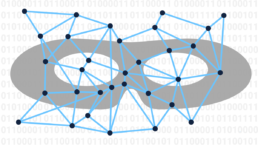Tears for Tears

The tears in our cultural fabric are deep. We are torn and divided. We have little common ground. Do we give up? Eat more cheese? Stay on the couch? Invest in Chevron?
The challenges in front of us are real and consequential. The U.S. election season highlighted the current schism in our world and exposed the inequalities in front of us all:
- There are no easy solutions for the CoVID-19 pandemic. People are sick and people are dying. My 26-year-old son spent a night in the ER and my sister-in-law’s father died last week. The virus is scary and real.
- The struggle for racial justice has been deeply exposed through our current divisions.
- The climate crisis does not give us much time to get our act together.
These bullets are overwhelming. The key is to work to find possible solutions and create a plan of action, and then act. We can solve problems by attacking them head on, incrementally.
The ancient Chinese philosopher Lao Tzu taught that there is your way, my way, and the way of truth. We need to separate people from the problem and focus on the common ground that is the truth:
- I know it is obvious, but science and data must lead the solutions for the pandemic. My wife is a nurse and she is encountering CoVID-19 patients. Because she and the nurse-doctor team take it seriously, wear their PPE, wash their hands, and keep physically as distant as possible (not that easy when giving shots, etc.), nobody on her team has contracted the virus. Business and school can be conducted if it is done very carefully. Follow the data to open safely.
- We all need to recognize the racist past of our world and be honest about how it has created systems of inequality. We share this past. Actively creating new systems, and businesses, that change the access and opportunities for disadvantaged communities provides multiple pathways to change. Diversity does make us stronger. Fixing would help (here is one proposal driven by data). Support companies like FreeCap.
- The climate crisis is real. While the clock is ticking, there are solutions that are creating change and opportunity. It ends up being a good business decision to care about the long-term future of our world (I know I say that often). Watch David Attenborough: A Life On Our Planet. Support companies like Uncharted Power.
It is a difficult time to write a blog – to recognize the real challenges, while simultaneously seeking common ground – and authentically demonstrating optimism for a brighter future.
But we do share so much as one human race. We can be together. We do have the agency to affect positive change. Our common bond is a better collective future. Drink more water. Move with purpose. Invest in impact. Invest in Change Finance.
Allow tears of joy to flow and to start healing the deep tears. Seek solutions to the problems and find common ground to move forward. I am.
Craig Jonas is the CEO and founder of CoPeace. As a forward-thinking holding company, CoPeace is building a portfolio of carefully selected for-profit companies with measurable social and environmental impact. To learn more about impact investing, check out CoPeace’s Intro to Impact Investing.
CoSpo: Changing the World Through Sports
I love sports.
I’ve been involved in sports in one way or another my entire life. I love the competition, the teamwork needed to be successful, the human drama, the camaraderie, the physical fitness aspect, and the lifetime friendships that develop.
But I also love sports because they can bring out the best in humanity. Sports can positively impact the world in ways well beyond the playing fields, courts and ice rinks.
Nelson Mandela said it perfectly, “Sport has the power to change the world, the power to inspire and the power to unite people in a way little else can – it is an instrument for change.”
Sport is certainly a powerful cultural institution, and it can be tapped for good.
“The rituals of sport engage more people in a shared experience than any other institution or cultural activity today,” said author and public policy consultant Varda Burstyn.
Through the years, there has been a lot of excellent philanthropic work done through sports. At CoPeace, we celebrate that fact and encourage it. However, we think there’s tremendous potential to impact the world via sports well beyond the limitations of pure philanthropy.
That’s why we launched CoPeace Sports, or CoSpo, this week. CoSpo is a wholly-owned sports impact subsidiary and is part of the CoPeace holding company portfolio. CoSpo’s mission is to help athletes, coaches and sport organizations maximize their ability to positively impact society.
CoPeace Sports is legally designated as a public benefit LLC (PBLLC). As such, we can help sports entities of all kinds enhance their positive impact activities through both non-profit and for-profit endeavors and activities.
We have a lot of sports-related experience on the CoPeace team. We’ve seen how sports can bring people together in pursuit of a common cause, and we want to leverage that uniting aspect of sport for the good of society.
“Sports is just such a powerful thing,” said Ed Tepper, CoPeace’s chief operating officer. “It taps into the emotions, and we have an incredible opportunity here to use that power and direct it in a positive way that goes far beyond anything philanthropy can do—to create self-sustaining opportunities for companies to do good, help others and make money at the same time.”
CoPeace Sports has been created to be a true win-win endeavor and I’m excited to see the positive impact the company will have as it grows.
Ken Reed is a Senior Communications Advisor at CoPeace. As a forward-thinking holding company, CoPeace is building a portfolio of carefully selected for-profit companies with measurable social and environmental impact. To learn more about impact investing, check out CoPeace’s Intro to Impact Investing.
“Basic” Education

After changing from my sleep pants to my “work” sweatpants, and right before jumping on the first of what seems like an endless array of video meetings, I had some time to reflect on our recent household “emergency.” My daughter’s computer charger has stopped working.
I’ll spare you the boring details, but it took two very stressful days of watching the battery percentage helplessly drop before we were able to get a new charger. This was an emergency, since my daughter, like a large portion of the children around the world, is going to school remotely and a working computer is required for school education…a computer! Let that sink in.
School supplies used to be a notebook, a pencil, and a book (and an optional Transformers lunch box …if you were cool).
Through this pandemic we have seen a great push for social equality. It has been a problem for so many years and education sits right smack in its center of the issue. The access and quality of education are just a few of the issues that widen the divide in our society. Internet connectivity, a computer, and even electricity are luxuries a lot of us take for granted, and we only see their true value when they are suddenly gone. If you have kids, just trying shutting off your WiFi for five minutes and see your sweet child instantaneously morph into The Incredible Hulk!
As we try and plan for a better future on the other side, we cannot ignore the lessons we learn during the pandemic. We now know what the future will look like, we now know what the future will require from our children to be successful. So that is where we should invest our money.
We should invest in a future where each child has what they need to succeed. This way we not only become a more fair and just society, but we also become a more successful and prosperous society, where bright minds have the right platform to excel and ideas can flourish. This is not only the right thing to do socially, but the right thing to do financially!
At CoPeace we believe in investing in companies who create those platforms and the type of impact that changes generations. We do so, not by being psychic or pretending we know more than anyone else, but by taking note of the world around us and the direction it is heading toward.
Hanan Levin is a Senior Investment Advisor at CoPeace. As a forward-thinking holding company, CoPeace is building a portfolio of carefully selected for-profit companies with measurable social and environmental impact. To learn more about impact investing, check out CoPeace’s Intro to Impact Investing.
Why Does My Digital Privacy Matter?

Share
Why Does My Digital Privacy Matter?
By Jim Crawford
With a name like Jim, it’s easy to end up with dozens of nicknames over the years. One of the quirkiest nicknames I’ve earned is “Tinfoil Hat Jim.” The name implying my propensity for sharing (too passionately, sometimes) about the underrepresented problems of the world. Many may be addressed in future blogs. However, one in particular, is incredibly important to me – your digital data and privacy.
WAIT DON’T LEAVE!
Yes, data and privacy. Please stick with me, as I try to make a case for why this matters. In honor of my family and friends, I wanted to list some of the most common responses I hear when a discussion about digital privacy comes up:
1. “I don’t care if they see what I’m doing. I don’t have anything to hide.”
Ahh, this one. You essentially denounce yourself as so meaningless, who would even bother? It works in theory, but unfortunately your data is what makes everyone else’s data so valuable – and vice versa. In the business of selling info, large sets of user data are required to glean habits and trends of different demographics.
This information is only valuable in large sets to build patterns with machine learning and algorithms. The data gatherers are hoping you and 5 million other people won’t care enough to secure your data – that’s the most valuable result for them. In the words of Plato, “To be silent, is to consent.”
TL;DR: It’s precisely because enough people just don’t care, that everyone else’s data is so valuable and it becomes easier to discern your personal preferences and opinions.
2. “Oh well, they already have all my info anyway.”
It’s true that consumer data protection has largely been ignored and violated for decades now. And it’s true some of your old info is probably in the hands of parties that should not have it. While a lot of your past history may be out there for someone to use or sell, why would that be a reason to continue providing those parties with more current and personal data about you? Think about your oldest email addresses, credit cards, and passwords. The data most likely to be compromised is probably already irrelevant to you, expired, or unused. But it’s not a logical reason to continue leaving yourself vulnerable to privacy violations.
TL;DR: If your sink was leaky, would you neglect to fix it because some of the water already leaked out?
3. “Well, I’m broke anyway, so the joke is on them.”
While Aunt Margery probably got the whole family paranoid after watching a broadcast special about “the foreigners” stealing your credit card info, let’s not go make a Facebook post about it…yet. Your primary concern is not really that someone will steal your money. This is where some of the strongest data security regulations already exist, thankfully. The concern is that data collectors will be able to build a profile on you and influence your habits and belief systems.
TL;DR: The big players aren’t after your money, directly. They are after your habits, patterns, and beliefs.
In general, I think the greatest mistake we make as a population is assuming our surface data is all that’s being collected. In reality, governments and corporations are tracking thousands of data points on each one of us – financial, political, commercial, social. How long we hover on text and images, which devices we are connecting with, where we are connecting from, what themes develop from our search history.
Want to take the first step in protecting your personal data? See some of my simplest recommendations below.
1. Make Mozilla Firefox or Apple Safari your default web browser.
Website cookies and trackers normally follow you around the web, track your actions, and report the data back to an organization. Firefox and Safari are making the most progressive attempts to prevent this by having each tab represent its own internet session. This way trackers cannot exit their own tab to track your other web activity.
2. Change your default search engine to DuckDuckGo.
Yes, DuckDuckGo. It sounds funny, but it is the antithesis to Google. Many search engines are the biggest offenders of privacy. Google began tracking and storing user data under the guise of providing more relevant ads. This has quickly devolved into complex personality profiles built “anonymously” and sold to the highest bidders, who want specific demographics to receive their message. The DuckDuckGo search engine does not operate on this revenue stream and doesn’t collect personalized data to profile and store.
It’s important to recognize that the more someone knows about you, the easier it is to understand you, including your wants, needs, and beliefs. At its least sinister, this means targeted advertising and location tracking – getting you to direct your money toward them. However, utilized in more sinister ways, this data can be used for voter suppression, political manipulation, social unrest, and even global disruption.
Jim Crawford formerly worked with CoPeace in business communications. As a forward-thinking holding company, CoPeace is building a portfolio of carefully selected for-profit companies with measurable social and environmental impact. To learn more about impact investing, check out CoPeace’s Intro to Impact Investing.




